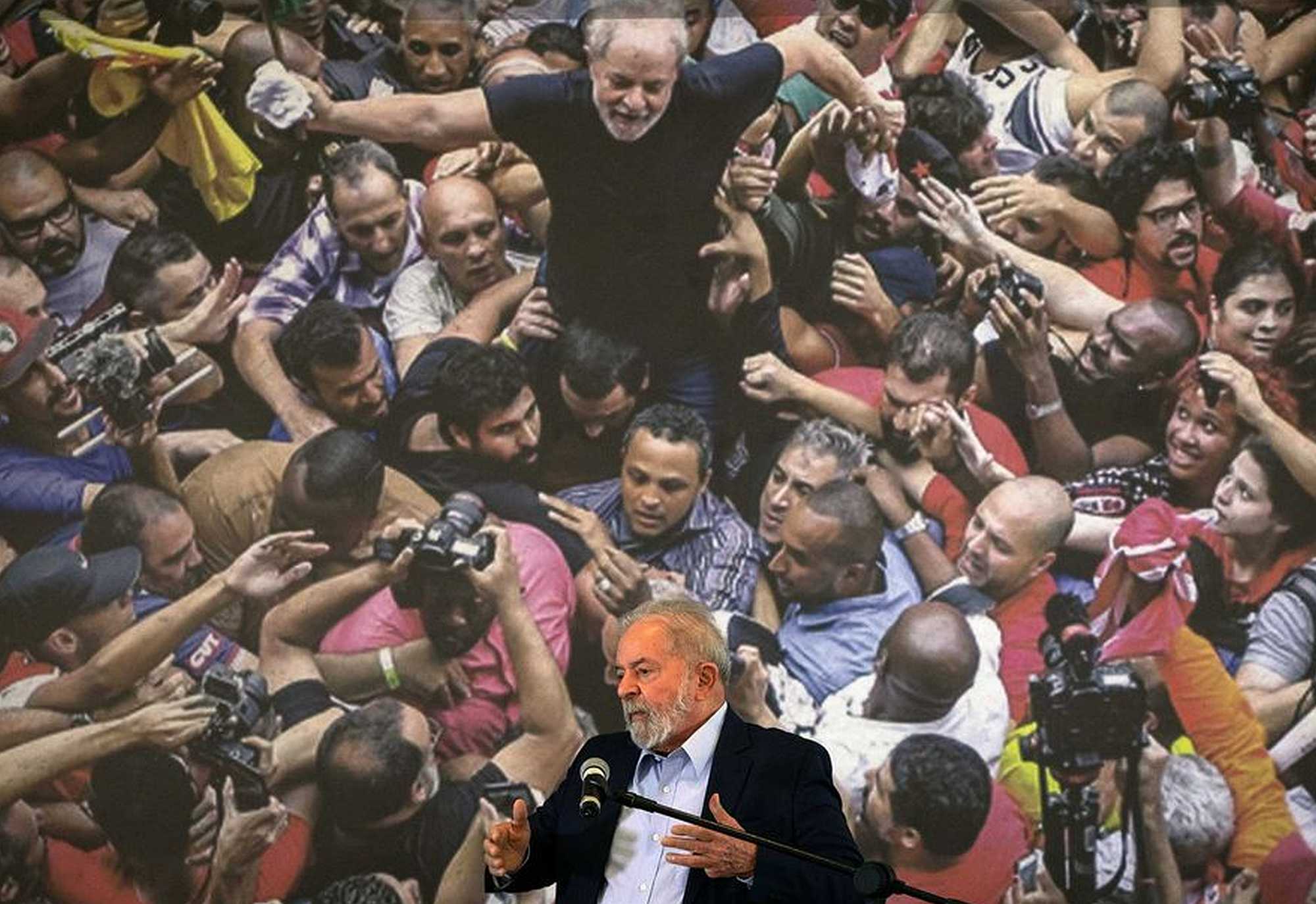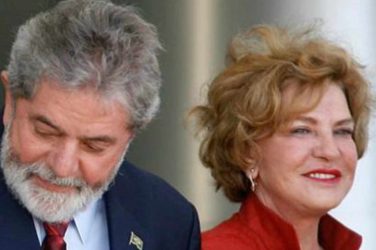Brazil’s former president Luiz Inácio Lula da Silva showed that his political career is far from over. Lula, as he is more commonly known, returned to address the nation after the annulment of his corruption convictions.
Lula was previously known for his casual attire, including many red shirts, in honor of the Workers’ Party, which he founded in 1980. This time, sporting a sharp dark suit with a powder blue dress shirt, the 75-year-old’s message was clear. He is back.
Earlier this month, a justice of Brazil’s Supreme Court annulled Lula’s two bribery convictions, clearing the way for the former president to run in the 2022 elections and challenge the far-Right president Jair Bolsonaro. Lula, who led Brazil between 2003 and 2011, said he remained unsure about whether to seek a third term.
Barely looking down at his notes during a speech that lasted nearly two hours, Lula showcased his trademark confidence and charisma throughout. A metalworker who rose to prominence in the 1980s as a union leader, Lula used everyday language to discuss the economy and to criticize Bolsonaro for his handling of the COVID-19 crisis that has besieged the country, claiming that Brazil currently “has no government”.
Although it remains unconfirmed whether his name will be on the ballot next year, many pundits and members of the public are certain it will. Certainly, his public appearance this week bore all the hallmarks of a presidential campaign.
Addressing journalists while standing in front of a famous picture of himself being held aloft by a crowd of supporters, and with a banner in the top right-hand corner reading; “Health, jobs and justice for Brazil”, Lula immediately took aim at the injustice that had been bestowed upon him.
Declaring himself “the victim of the biggest judicial lie told in the country’s 500-year history”, Lula went on to describe the suffering he endured in prison from April 2018 to November 2019, when the Supreme Court ruled that defendants may remain free while their appeals are pending.
Lula was sentenced to 26 years after being convicted of accepting bribes from Petrobras, Brazil’s state-owned, multinational oil company, in two separate corruption and money-laundering cases.
He was investigated as part of the largest anti-corruption effort in Brazil’s history, Operation Car Wash (Lava Jato), which was led by a mega taskforce from the federal police’s Curitiba branch.
Scandal, Ambition and Operation Car Wash
Lula’s conviction and subsequent arrest prevented him from running in the 2018 presidential elections, which took place six months after his sentencing. While sitting in jail, Lula still led Bolsonaro in the polls, with many harboring suspicions that his arrest was engineered to ensure a Bolsonaro victory.
While Lula’s star dimmed in jail, the man who was hailed by many to be the solution to Brazil’s deep-seated corruption problems, Sergio Moro, shot to stardom. The former judge gained widespread recognition for his active role in the taskforce and for ordering Lula’s arrest. He became a hero in the eyes of half of the population in a divided nation.
The other half believed him to be a self-serving careerman with political aspirations. When Bolsonaro announced he had picked Moro as his justice minister, the accusations of bias grew louder. Nevertheless, admirers of Operation Car Wash stood by his decision to accept a political office.
However, the situation changed in mid-2019, just six months into Bolsonaro’s presidency and Moro’s new role. On 9 June, the online publication The Intercept Brasil, led by Pulitzer Prize-winning journalist Glenn Greenwald, began publishing a series of leaked messages exchanged on Telegram between figures involved in the taskforce.
Many of them seemed to suggest that Judge Moro communicated frequently with prosecutors and that he even counseled the team behind Lula’s corruption charges.
That was to prove the beginning of the end for Moro. After falling out of favor with Bolsonaro, the former judge resigned in April 2020, less than a year after the scandal that became known as Vaza Jato (roughly translated as Car Wash Leaks).
Even before The Intercept’s bombshell revelations, jurists often pointed out the inconsistencies and contradictions in the case against Lula. In the eyes of his supporters, Lula was a political prisoner, and inspired the Free Lula movement (Lula Livre). The leaked messages renewed hopes among his supporters that his convictions would be overturned.
Lula’s defense team asked the Supreme Court to judge whether Moro had acted with the necessary impartiality. On Tuesday, the five justices assigned to the case tabled the decision. They tied in a 2-2 vote after the fifth judge, who joined the court in November, said he was unable to cast an opinion because he lacked sufficient knowledge of the case.
Pathway to the Presidency
While connected to the accusations against Moro, this week’s annulments stemmed from a different argument.
Justice Edson Fachin – who voted against the prejudice charge against Moro back in December – ruled that the four cases against Lula fell outside of the jurisdiction of the 13th Federal Court of Curitiba, contending that the crimes did not happen in the city, located in the southern state of Paraná. The cases will be forwarded to the capital of Brasilia for reconsideration.
Fachin’s decision does not exonerate Lula, as the judge did not determine whether the former president was innocent or guilty of the charges brought against him. Regardless, Lula is now free to run for office until he is re-tried in the capital, which could take years. To become ineligible again, Lula would have to be convicted before submitting his candidacy in mid-2022, which is unlikely to happen.
Brazil’s attorney general’s office has appealed against Fachin’s decision, asking the Supreme Court to reverse it. However, Fachin’s arguments are in line with previous decisions taken by the country’s highest court, which legal experts claim are unlikely to be overturned.
Seeing that Fachin sided with Moro in the prejudice accusations against him, the internal assessment in the Supreme Court is that he opted to overturn the convictions against Lula to prevent others from using the same argument against the former judge, starting a domino effect that could jeopardize the entire Car Wash inquiry.
Economic Decline and the Amazon
Though Lula is now free to run for office, the political landscape has changed since he left the president’s office in January 2011 with a record 83% approval rate, which made him Brazil’s most popular president in modern history.
Following his speech on Wednesday, the dollar dropped by 2.5% and the Brazilian stock exchange rose by 1.3%. This week’s polls place Lula just six percentage points behind Bolsonaro in the 2022 presidential election, a gap that is likely to narrow after the court’s ruling.
Lula’s re-emergence comes at a time where Brazil is still struggling with the pandemic, with a death toll of more than 280,000 – the world’s second highest. Bolsonaro has consistently been criticized for downplaying the pandemic and his denial of science, aggravating the problem in a country where implementing social distancing measures is already challenging given that 41.4% of the population depend on informal jobs and at least 13.6 million live in overcrowded, marginalized neighborhoods known as favelas.
Despite Bolsonaro being elected partly thanks to his ultraliberal economic promises, Brazil’s GDP, which had grown by a disappointing 1% in the first year of his presidency, has shrunk by 4.1% amid the pandemic – the worst setback since 1996.
Bolsonaro, with his growing far-Right agenda, has lost support among the financial elite and investment in the country has fallen by half. His disregard for the environment – particularly the Amazon, which has had record deforestation rates under his administration – has also hurt Brazil’s relationship with some of the world’s most powerful economies: US President Joe Biden has threatened Brazil with sanctions, while European companies have threatened boycotts of Brazilian products.
Although Brazil’s current predicaments may encourage Lula, especially after the recent events, there is still room for caution. The annulment of his conviction is not a definitive victory for him or his supporters.
In a country with a 400-page constitution and a complex judicial system, decisions can be made and unmade in a matter of days. But Lula and his supporters will certainly be celebrating while they can. After all, Bolsonaro seems shaken.
Manuella Libardi is a Brazilian journalist and the Brazil editor for democraciaAbierta. She holds a Masters degree in International Relations. Twitter: @ManuellaLibardi
This article appeared originally in Open Democracy – https://www.opendemocracy.net/






